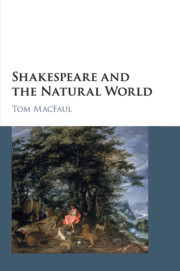Description
Shakespeare and the Natural World
Author: MacFaul Tom
This book explores the rich range of meanings that Shakespeare finds in the natural world, enabling new readings of his works.
Language: EnglishApproximative price 32.87 €
In Print (Delivery period: 14 days).
Add to cart
Shakespeare and the Natural World
Publication date: 01-2019
Support: Print on demand
Publication date: 01-2019
Support: Print on demand
Approximative price 106.56 €
In Print (Delivery period: 14 days).
Add to cart
Shakespeare and the Natural World
Publication date: 11-2015
Support: Print on demand
Publication date: 11-2015
Support: Print on demand
Description
/li>Contents
/li>Biography
/li>
Exploring the rich range of meanings that Shakespeare finds in the natural world, this book fuses ecocritical approaches to Renaissance literature with recent thinking about the significance of religion in Shakespeare's plays. MacFaul offers a clear introduction to some of the key problems in Renaissance natural philosophy and their relationship to Reformation theology, with individual chapters focusing on the role of animals in Shakespeare's universe, the representation of rural life, and the way in which humans' consumption of natural materials transforms their destinies. These discussions enable powerful new readings of Shakespeare's plays, including A Midsummer Night's Dream, As You Like It, King Lear, Macbeth, The Tempest, The Winter's Tale, and the history plays. Proposing that Shakespeare's representation of the relationship between man and nature anticipated that of the Romantics, this volume will interest scholars of Shakespeare studies, Renaissance drama and literature, and ecocritical studies of Shakespeare.
Introduction: broken knowledge; 1. Country matters; 2. Man and other animals; 3. Lawful as eating? Food, natural magic and the arts of health; 4. The Tempest; Bibliography; Index.
Tom MacFaul is Lecturer in English at St Edmund Hall, University of Oxford. He is the author of many books and articles, including Problem Fathers in Shakespeare and Renaissance Drama (Cambridge, 2012), Poetry and Paternity in Renaissance England (Cambridge, 2010) and Male Friendship in Shakespeare and his Contemporaries (Cambridge, 2007).
© 2024 LAVOISIER S.A.S.





